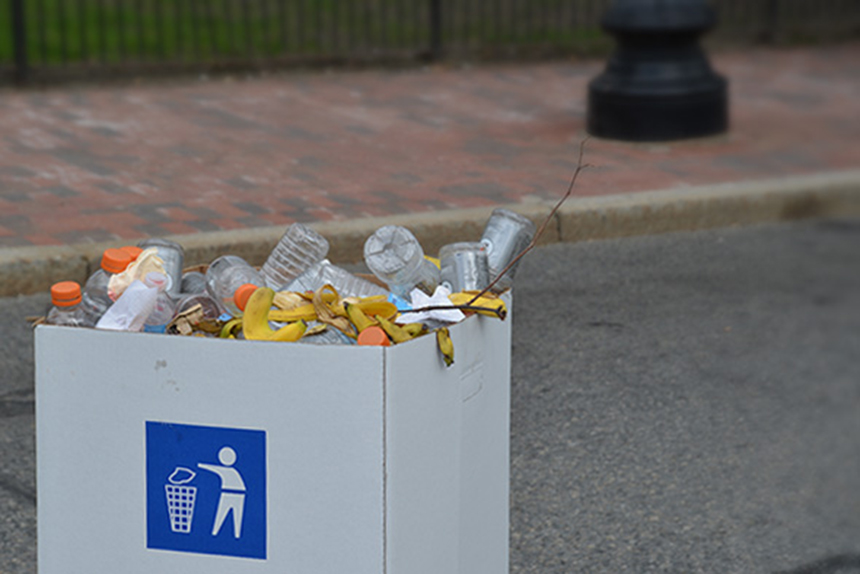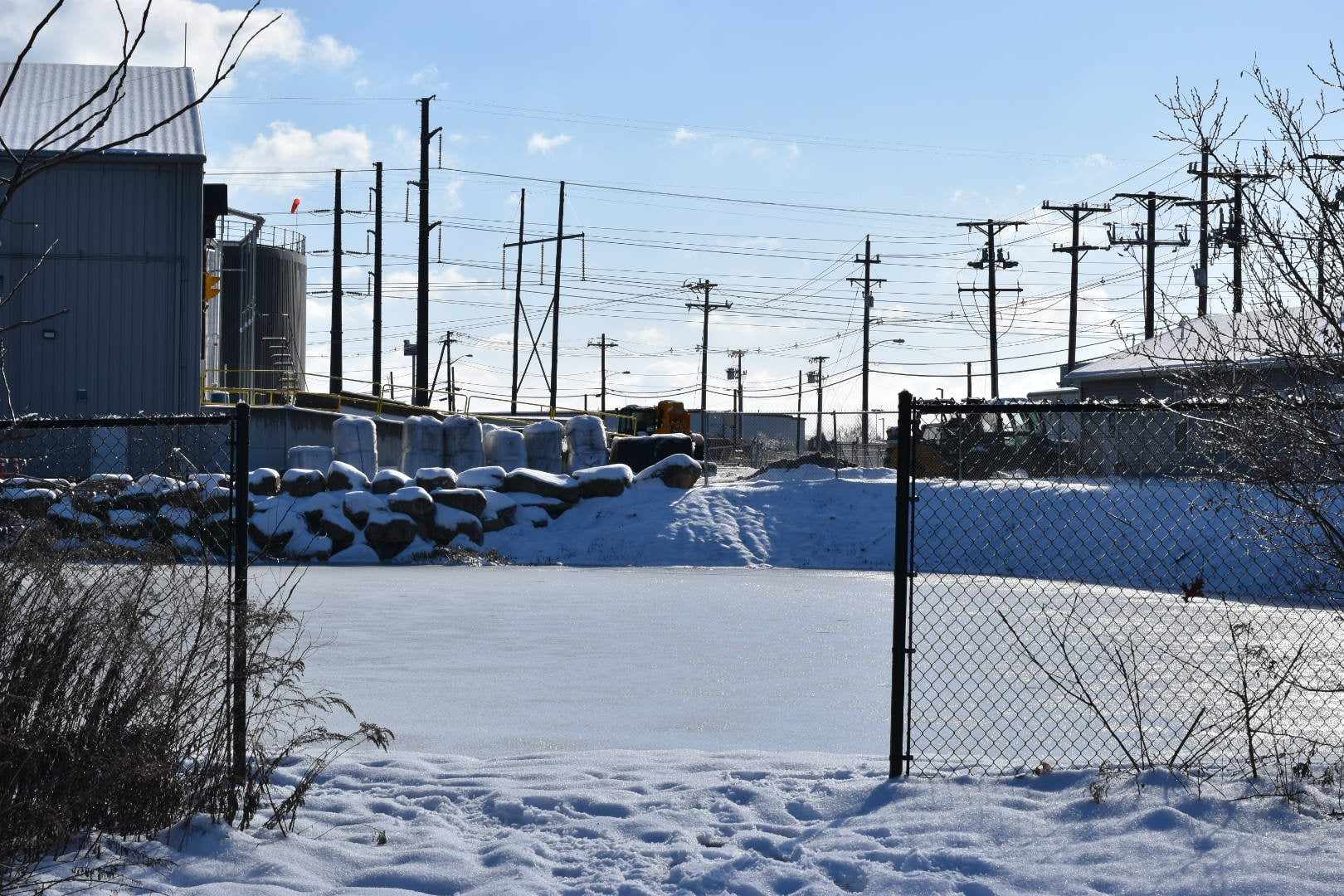Johnston Anaerobic Digester Odors Causing Problems for Neighbors
January 22, 2024
JOHNSTON, R.I. — One of the state’s latest renewable energy facilities is making a big stink for its neighbors — literally.
The Rhode Island Bioenergy Facility (RIBF) LLC is the state’s first anaerobic digester, turning organic waste and feedstock into biogas that generates electricity for the state’s electrical grid.
Billed as the largest facility for organic waste recycling in New England, the Scituate Avenue business processes 100,000 tons of organic waste annually that would otherwise be landfilled or incinerated. The long-running project has been gestating for more than a decade, with then-owners Orbit Energy Rhode Island LLC repeatedly pushing its operation date back.
Now that it’s open, there’s a problem: it stinks.
“I have been able to smell it from Interstate 295,” said Jack Restivo, describing the odors emanating from the biogas facility. “There have been some mornings when I would come into work, and before I got on the off-ramp, I could smell it.”
Restivo, a small-business owner, has owned the property and building next to the digester facility for nearly 20 years — well before the biogas plant project was originally proposed. He uses part of the space to house his family owned and operated HVAC business, Restivo’s Heating and Air Conditioning, which has been in his family serving Rhode Island and Massachusetts since 1936. The rest of the building is leased out to other small businesses, including a gym.
For the past six months, Restivo, his employees, and his neighbors have been dealing with a repeated series of odors emanating from RIBF during its daily operation. There’s no rhyme or reason to when a noxious odor will blanket the area surrounding the facility, but Restivo said the odor was so bad it made working difficult, if not impossible, at times. Restivo said he’s no stranger to foul odors; just a little bit further down the road from his building is the Central Landfill.
When ecoRI News sat down to interview Restivo last week at his Johnston business, there was a noticeable odor in the air outside the building, but Restivo told ecoRI News the actual odors from RIBF were much worse than that.
The odors from the facility have been relentless, according to Restivo, who said many times he, his employees, and his customers can smell the odors from inside his building. Restivo said he has noticed customers leave because of the odor, and at times, he has sent some of his employees in the warehouse home because of the stink.
Restivo acknowledged it’s difficult to describe a bad smell, and the specifics can vary depending on the occasion. Several times during his interview with ecoRI News, Restivo described the odors emanating from his neighbor as “putrid” or “rancid.”
Prior to the nuisance odors wafting onto his property from RIBF, Restivo said he had no issues with the project, aside from a setback encroachment he was notified of last spring, and he’s even leased part of his property to the biogas facility, for their employees to use for parking.
“With all the issues we’ve had at the landfill over time, nothing has compared, or even come close, to the odors we are experiencing from this facility,” he said.
The biogas facility owned by RIBF is an anaerobic digester. It works by taking organic matter — wastewater biosolids, food scraps — and breaking it down in the absence of oxygen to turn it into gas that can be then used to generate electricity. Some odors in the process are a feature, not a bug, but in states like Rhode Island, the onus is typically on a facility to manage any nuisance smells produced by its operations.
In 2021, the facility was acquired by its current owner, Canada-based Anaergia, a company dedicated to cost-effective green technologies such as anaerobic digestion.
Since late August of last year, the bioenergy facility has racked up 60 complaints with the state Department of Environmental Management, many of them filed by Restivo, his employees, or other plant neighbors.
Many of the complaints describe the odor as a “strong toxic chemical and gas smell,” while other complaints indicate some of the workers in and around Restivo’s building complained of headaches and nausea from prolonged exposure to the stink.
“It’s one of our frequent offenders,” DEM director Terry Gray told ecoRI News.
DEM first inspected the facility following the late-August odor complaints on Sept. 13, according to agency records. In their summary of the inspection, DEM staff noted at the time of their inspection the presence of “distinct and strong odors they determined to be objectionable,” and additionally noted “the odors caused the inspectors to want to avoid the area.”
At a follow-up inspection the following week, on Sept. 18, the inspector wrote, “the odors were so strong the inspector had to return to his car within minutes to avoid the odor,” and “slight putrid or rotten odors were also detected within the office building on the adjacent property.”
DEM’s Office of Compliance and Inspection issued a compliance order for nuisance odors the following week, on Sept 22, and required the facility to submit an odor remediation plan to the department, which it did on Sept. 28.
In the remediation plan approved by DEM, RIBF said its investigation into the odors found the channeling within the facility’s biofilter at fault, believed to be related to heavy rains that occurred Aug. 19. The company noted it was repairing the channeling.
Despite DEM’s compliance order and RIBF’s remediation plan, the nuisance odors coming from the facility remain unresolved, even after repeated inspections by state regulators. In the four weeks after DEM issued its September compliance order, the facility racked up another 19 odor complaints.
The repeated complaints led DEM to issue a notice of violation (NOV) on Dec. 22, alleging the company had failed to control the repeated nuisance odors from its facility the public had been complaining about since August. State regulators also fined RIBF $15,000.
Alexander MacFarlane, vice president of RIBF, told ecoRI News in an email the company was notified of several complaints in late August and early September, and has since made improvements to its treatment process and odor control.
“We have increased air collection capacity within RIBF’s receiving building and upgraded odor control biofiltration,” he wrote. “There’s still some improvements to the odor performance of the plant that are coming online over the next few months as well.”
The company, MacFarlane added, “takes odor control mitigation in the Johnston community seriously. At RIBF we have invested our time and money to enable large-scale organics recycling in RI while minimizing impact at the fence line.”
The company, said MacFarlane, also posts a hotline number for people to phone in odor complaints, and hires a third-party observer to track odors.
MarFarlane also said RIBF has been undergoing a series of upgrades since early 2022, making improvements necessary to recycle food waste away from the landfill into renewable biomethane and digestate fertilizer. The facility has continued to operate during its renovations, and expects all upgrades to be completed by this spring.
MacFarlane declined to comment on the NOV or the $15,000 fine, but indicated the company was appealing DEM’s decision.
It wasn’t RIBF’s first run-in with state regulators. According to DEM documents, a July 25 inspection of the facility by officials from the agency’s Office of Air Resources revealed that the facility completed modifications that weren’t covered in RIBF’s original air permit, and the company was not accurately recording emissions data required as part of its permit. DEM issued a notice of intent to enforce on Aug. 24.
“They’re amending their permit,” said Gray of the August notice. “But we haven’t made a determination if we’re going to issue a fine.”
Meanwhile Restivo, his employees, and his neighbors still have to live with the odors. He said there’s no predicting when they will happen; they seem worse in the mornings, and sometimes when it’s wet out, but the timing of the nuisance odors are consistently inconsistent.
Restivo and his neighbors want the area and their businesses to go back to a time before the odors became a serious nuisance.
“We shouldn’t have to be the ones that sacrifice our livelihoods,” Restivo said. “Our employees and our businesses have been here prior to when [RIBF] came and started doing it. I don’t think that’s right.”




Anaerobic digesters are VERY fussy technology. Several companies, as noted in the article, have tried to make it work in Johnston for the last 15 years, as the President of Orbit spoKe at the 2nd RI compost conference in 2010 and they had been at it for a while. They went broke eventually. When they work right , digesters can be useful, but actual composting is even more useful wherever it can be done, as we can use the compost to grow more food and build soil. I have always hoped they would succeed, but it sure does not sound like it, if they cannot really figure out what is going wrong and simply fix it.
This is further proof that distributed composting infrastructure with robust state and municipal support is more effective and more beneficial to communities and the environment than centralized, high tech, anaerobic digestion.
Not to be sarcastic, but this state could not successfully organize and operate a one-car funeral. DEM has investigated the site which yields lots of talk and paperwork, but no remediation, shutdowns or fines. Typically, a lot of nothing is what happens in these cases as they drag on for months and years.
I wonder if they can build a structure around the entire odor producing thing, use solar panels to provide energy to power a hepa filtration or AC system .
Take care, these plants are all but not safe, and gaseous and odor emissions far from safe.
We suffer this in France: cnvmch.fr
Sanitary problems to come for sure !
Collectif Scientifique National Méthanisation
They need to increase the amount of intake air through additional air handlers to create a greater constant negative pressure which is referred to as the pressure gradient (water gauge pressure or as it is referred to as hg.) to .06 or greater in the receiving building to help solve this.
If any of the waste they are receiving has garbage that has nail polish and other household chemicals the fumes from off gassing will be very evident.
Anaerobic digesters